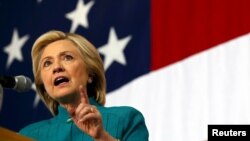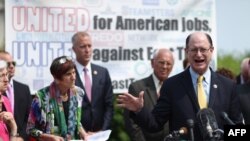Democratic Party presidential frontrunner Hillary Clinton has called on President Barack Obama to work with congressional Democrats to salvage Trade Promotion Authority (TPA), seen as crucial to the Trans-Pacific Partnership (TPP) free-trade agreement. A leading congressional Republican said he remains optimistic TPA will be approved because of the enormous consequences free trade agreements hold for American leadership.
Former Secretary of State Clinton, during a campaign appearance in Des Moines, Iowa Sunday, called on Obama to listen to those Democrats who Friday rejected a measure on job retraining funding tied to TPA.
"In my time, eight years in the Senate, I voted for some trade agreements and I voted against others. I think I have a pretty good idea of what we can do to meet the tests that I believe any trade agreement, especially TPP must meet. It needs to, number one, protect American workers, number two, it needs to raise wages and create good jobs at home, number three, it needs to be in our national security interests. I’ve been saying that for months.
"Now, here’s what I think should happen now. In order to get a deal that meets these high standards, the president should listen to, and work with, his allies in Congress, who have expressed their concerns about the impact that a weak agreement would have on our workers, to make sure we get the best, strongest deal possible and, if we don’t get it, there should be no deal," said Clinton.
No explicit endorsement
Clinton, who has been criticized for not speaking out earlier on TPP, has not explicitly endorsed it, preferring to wait until negotiations among its 12 Pacific Rim partners are complete.
Opponents of TPP, including organized labor, consumer, food safety and environmental groups, say such free-trade agreements result in job losses and reduced wages, while doing little to boost worker protections overseas. Senator Bernie Sanders, who is challenging Clinton for the party’s 2016 presidential nomination, said he understands the message congressional Democrats are sending.
"Maybe we should have a trade policy which represents the working families of this country that rebuilds our manufacturing base rather than just representing the CEOs of large multi-national corporations," said Sanders.
Faced with the possibility of another vote on Trade Adjustment Assistance (TAA) this week, Sanders said he hopes Clinton will side with those who view TPP and other free-trade agreements as a disaster that must be defeated. He said trade policy should demand that corporate America invest in the United States, rather than other countries.
Ryan optimistic
Republican Congressman Paul Ryan (R- Wis.), chairman of the House Ways and Means Committee, said congressional Democrats abandoned Obama “in droves” and that the president has a lot of work to do with his party to turn it around.
"I’m optimistic. I think this can be salvaged because I think people are going to realize just how big the consequences are for American leadership," said Ryan.
Ryan said this is about America’s role in the global economy, whether it will write the rules on trade-related standards and expand markets for more jobs, or just retreat. He added that members of Obama’s own party are making him a “very lame duck president.”
Ryan argues such free-trade agreements have benefited small American businesses the most through lower or eliminated tariffs. He said one-in-five American jobs are tied to trade and such agreements often result in higher wages.
"If we say to the world, ‘We’re retreating,’ and we’re not going to do these trade agreements, then we’re going to let other countries like China write the rules of the global economy. There have been 100 trade agreements put in place since 2007, when TPA last lapsed. America has been party to zero of those," said Ryan.
Ryan said that means other countries are reaching agreements and keeping barriers up to American goods and services. He said the inability to knock down trade barriers or get other countries to play by U.S. trade rules would be a massive mistake and a failure of American leadership.
Negotiating power at stake
Appearing separately on U.S. television Sunday, Labor Secretary Tom Perez expressed confidence the job training measure, TAA, will be approved one way or another. He said America needs to set the rules for the global economy.
Charles Morrison, president of the Hawaii-based East-West Institute, warned that failure to pass "fast-track" trade authority, which limits presidential trade deals to an up-or-down congressional vote making them easier to reach with other countries, will push TPP off a couple of years.
"The question really is whether the United States can be a credible negotiating partner ever unless it has trade [promotion] authority well in advance before it begins a trade negotiation," said Morrison.
Asia specialist Michael J. Green of the Centers for Strategic and International Studies (CSIS) warns congressional failure to grant trade promotion authority to the president would be a disaster for Obama’s Asia policy. Green says it could prompt some TPP negotiating partners to reverse course on reforms and tariff concessions, and give new momentum to non-US economic institutions such as China’s newly-established Asian Infrastructure Investment Bank (AIIB).





